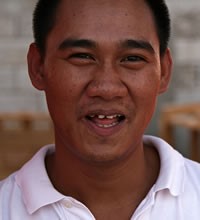Filipino, Tagalog in Spain

Photo Source:
MySabah.com
Used with permission
|
Send Joshua Project a map of this people group.
|
| People Name: | Filipino, Tagalog |
| Country: | Spain |
| 10/40 Window: | No |
| Population: | 38,000 |
| World Population: | 40,052,100 |
| Primary Language: | Tagalog |
| Primary Religion: | Christianity |
| Christian Adherents: | 92.00 % |
| Evangelicals: | 12.30 % |
| Scripture: | Complete Bible |
| Ministry Resources: | Yes |
| Jesus Film: | Yes |
| Audio Recordings: | Yes |
| People Cluster: | Filipino, Central |
| Affinity Bloc: | Malay Peoples |
| Progress Level: |
|
Introduction / History
Tagalog is the largest ethnic/language group residing in the Philippines, especially in the southern part of Luzon and nearby islands. The regions of Calabarzon and Mimaropa have the greatest concentrations.
They are one of the ancient dwellers of the Philippines. Tagalog culture developed in Taal, Batangas (the heartland of the Tagalog culture). The traditions of this people were passed orally. They developed a trading link with neighboring countries such as China, Japan, etc. Tagalogs have a writing system called baybayin. It uses diacritics to determine its pronunciation (similar to the Devanagari script of India).
During the Spanish colonization of the Philippines, the Tagalog homeland (especially Manila) became the center of colonial activity. During their rapid Christianization, the culture of these people dramatically changed from Asian to Hispanic . Eventually they revolted against the Spanish colonizers. Along with other ethnic groups, Tagalogs fought against the invading Americans and later, the Japanese.
After gaining their independence, the Tagalog population grew rapidly. A poor economy and political corruption have led to poverty, causing many to migrate to 56 countries for work, including Spain. They started migrating to Spain over 500 years ago during colonial days. Today Tagalogs are the third largest Asian community in Spain. They usually reside in either Madrid or Barcelona.
What Are Their Lives Like?
Tagalogs in Spain earn far more than they would had they remained in the Philippines. They often work as restaurant workers, hotel workers or house cleaners. Others are teachers or nurses. Some have a good education while those without struggle economically. Even those with a good education have trouble getting their credentials accepted. In recent years Tagalogs have started their own businesses, restaurants, bakeries and bars in Spain. Several Tagalogs in Spain have been professional athletes or actors.
What Are Their Beliefs?
Their religion is Christianity, usually Roman Catholicism. They commonly incorporate pre-Christian beliefs into the church. Some believe in traditional healers/herdsmen called "Albularyo" who heal them from their illnesses. Many also believe in mythical creatures like aswang, multo, and maligno.PRGRPHThere is also a strong Bible-believing element among them that God can use to extend the fame of Jesus.
What Are Their Needs?
Pray for Tagalog speakers to focus their faith and devotion on Jesus Christ, and him crucified.
Pray for them to become a major sending base for Muslims, especially in Mindanao Island.
Pray that soon Tagalog disciples will be making more discipl
Prayer Points
Pray for the Lord to be their protector.
Pray for Tagalogs to focus their faith and devotion on Jesus Christ, the only savior.
Pray for them to become a major sending base to Muslims.
Pray that soon Tagalog disciples will be making more disciples.